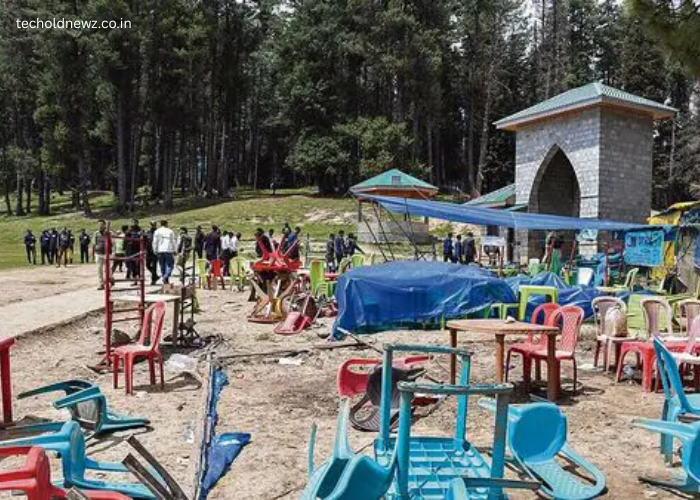Pahalgam Terror Attack Live Updates:
India has imposed an immediate ban on the direct or indirect import and transit of all goods originating in or exported from Pakistan, regardless of their import status, effectively halting bilateral trade flows, according to a notification by the ministry of commerce and industry.
The commerce and industry’s Gazette notification issued on Saturday reads, “In exercise of power conffered by Section 3 read with Section 5 of the Foreign Trade (Development & Regulation) Act, 1992, read with Paragraph 1.02 and 2.01 of the Foreign Trade Polivy (FTP) 2023, as amended from time to time, the Central government hereby inserts a new Para 2.20A in the Foerign Trade Policy, 2023 as follos with immediet effect.”
On April 22, 2025, a tragic terrorist attack occurred in Baisaran Meadows near Pahalgam, a popular tourist destination in Jammu and Kashmir. The assault resulted in the deaths of 26 individuals, including tourists from various regions.
The perpetrators reportedly used automatic weapons and small arms, targeting civilians and allegedly verifying their religious identity before executing them at close range. The Resistance Front (TRF), an affiliate of the Pakistan-based terrorist organization Lashkar-e-Taiba, claimed responsibility for the attack, citing opposition to the issuance of domicile certificates to non-locals as their motive. The Scottish Sun+4People.com+4Vajiram & Ravi+4People.com+2Vajiram & Ravi+2The New Indian Express+2
Investigation and Security Measures
The National Investigation Agency (NIA) has taken over the investigation into the Pahalgam terror attack. The agency has identified several local terror aides who are believed to have provided logistical support to the attackers. These individuals are reportedly affiliated with various Pakistan-backed terror outfits, including Hizbul Mujahideen, Lashkar-e-Taiba, and Jaish-e-Mohammed. Security forces have launched coordinated operations across South Kashmir to apprehend these suspects and dismantle their networks.
Political and Public Reactions
The attack has elicited strong reactions from political leaders and the public. The Jammu and Kashmir Assembly convened a special session to condemn the attack and pay tribute to the victims. A resolution was passed expressing deep sorrow and calling for justice. National Conference leader Surendra Chaudhary emphasized that such acts are direct assaults on the values of unity, peace, and harmony.
International Condemnation
The international community has also condemned the attack. Countries such as Afghanistan, Argentina, Armenia, Australia, Bangladesh, and Bhutan issued statements expressing their condolences and condemning the act as a heinous form of terrorism. These statements underscore the global consensus against terrorism and the importance of regional stability.
Security Enhancements
In response to the attack, security measures have been heightened across various regions. Punjab, sharing a border with Jammu and Kashmir, has issued a red alert, intensifying checks at interstate and inter-district crossings. Security has been increased at tourist spots, religious places, and educational institutions, especially those with students from Kashmir. The government has also bolstered the protection of individuals at high risk and increased patrolling around their residences. The New Indian Express.
Conclusion
The Pahalgam terror attack marks a significant escalation in the ongoing conflict in Jammu and Kashmir. The targeted nature of the assault and the involvement of both local and foreign operatives highlight the complex dynamics of militancy in the region. The swift response from national and international authorities, along with the heightened security measures, reflect a concerted effort to address the immediate threats posed by such acts of terrorism. However, the incident also underscores the need for sustained efforts to address the underlying issues contributing to militancy and to promote long-term peace and stability in the region.


